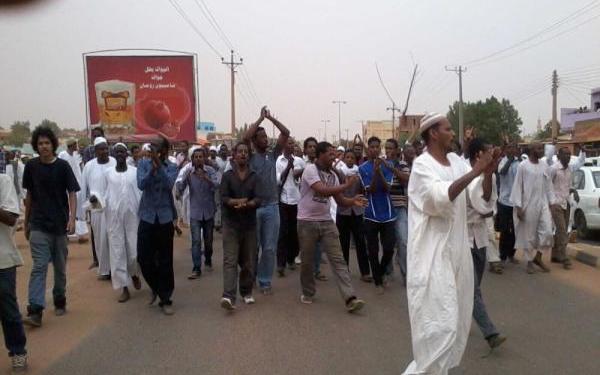
Earlier this month, four bodies were found in one of Wad Madani’s irrigation canals, just miles away from Sudan’s capital. The university town in the country’s breadbasket has been spared the endemic violence that has come to characterize life in Darfur, South Kordofan, and Blue Nile. However, a fight over tuition fees at Wad Madani’s Gezira University and the subsequent murder of four students has put events in the town at the center of Sudan’s political future.
On December 5, a group of Darfuri students came together to peacefully protest their university’s decision to charge tuition fees notwithstanding a 2006 presidential order, which promises free higher education to all Darfuris on the basis of the Doha peace agreement. The peaceful sit-in was interrupted by Sudanese intelligence and security officers who drove the students off campus using sticks and tear gas. The African Centre for Justice and Peace Studies, a Sudan-based human rights organization, reports that security officials chased the students from their meeting place and towards an irrigation canal. Almost 60 students were arrested on the banks of the river and taken into police custody. Although the majority of students were released on bail a few days later, the bodies of four students were discovered in the canal's ankle deep water. Witnesses told Amnesty International that the bodies bore signs of beatings and were bleeding from their heads.
The Wad Madani attack is just the latest incident in a systematic pattern of abuse of Darfui students around the country. At the University of Khartoum, Darfuri girls have consistently been harassed by state security forces. In Nyala, students were allegedly tortured in November 2012. The Sudanese government has established an investigative committee to examine the circumstances around the four Wad Madani students’ deaths. However, it is unlikely that the protesters will see this as a credible response, particularly since university officials continue to maintain that the students drowned.
In the absence of a formal coroner's report, tensions have grown. Many in the Sudanese opposition see the regime's focus on students at higher educational institutions as particularly troubling, since it has the potential to wipe out the Darfuri community's nascent intellectual class.
The students’ deaths have come to be a symbol of the Sudanese government's repression. Radio Dabanga reports that thousands of student protesters marched in Khartoum, expressing their solidarity with the students of Wad Madani. Protests spread to other major Sudanese cities. Both Human Rights Watch and Amnesty International have documented the Sudanese police’s excessive force in responding to these demonstrations. Witnesses report that the security forces have been targeting and beating protesters who look like they are Darfuri. On Tuesday, December 11, government forces burned down the dormitories at Omdurman Islamic University following a protest on campus. Then, on December 13, the government arrested Farouk Abu Issa, the leader of the National Consensus Forces, a coalition of over 20 Khartoum-based opposition parties. Issa was detained without charge after speaking at a memorial event for the murdered Darfuri students. Although Issa was released two days later, his unlawful detention is just one more example of the Sudanese government’s repressive response to the Darfuri students’ deaths.
Sudan has a long history of popular protest instigated by students. In 1964, the death of Ahmed al-Qureshi, an iconic student leader, sparked Sudan’s October revolution and motivated tens of thousands to protest the military regime’s repression. After five days of protests, Gen. Ibrahim Abbud announced the dissolution of the governing military council and stepped down. In April 1985, students from the Islamic University of Omdurman marched through Khartoum sparking a series of escalating protests that eventually forced dictator Muhammad Numeiri to flee the country. More recently, in June of this year, a series of anti-regime protests germinated at the University of Khartoum when the government announced austerity measures. At that time, the Enough Project's Omer Ismail predicted that the student-led #SudanRevolts movement was a “prelude” to the end of Bashir’s regime. This latest round of Wad Madani protests is particularly significant because they have not been restricted to Fridays, the traditional day of protest in the region. Instead, people have been consistently taking to the streets.
When coupled with the foiled coup and rumors of growing fissures in Sudan’s ruling National Congress Party, the palpable anger created by the Wad Madani incident is doubly significant. Still, Sudan’s opposition movement needs assistance building the capacity and organizational infrastructure necessary to make real institutional change a reality. Without a strong commitment to democracy and governance programming from the international community, the #SudanRevolts movement will not be able to progress and evolve into a movement for a new Sudan.
Photo: People gather in the streets of Khartoum for a protest earlier this year. (Nuba Reports)

